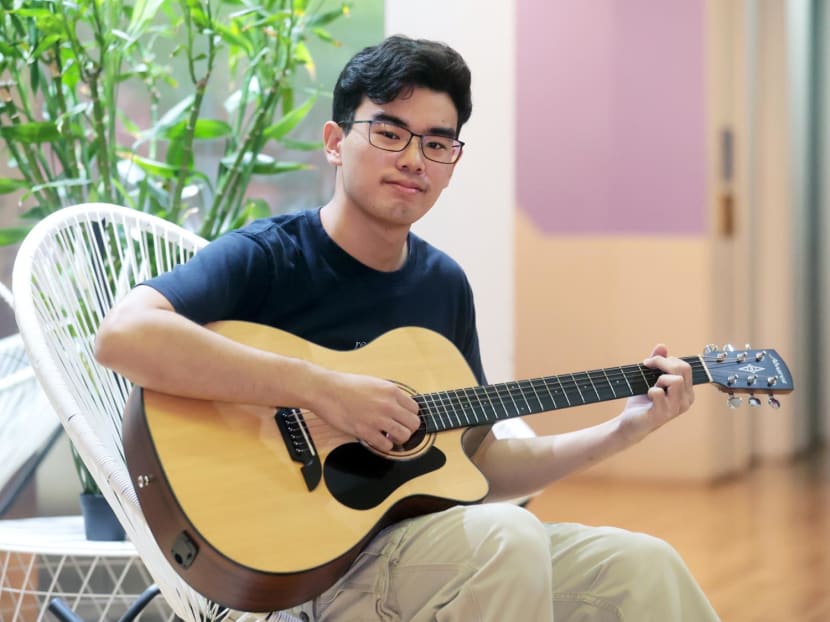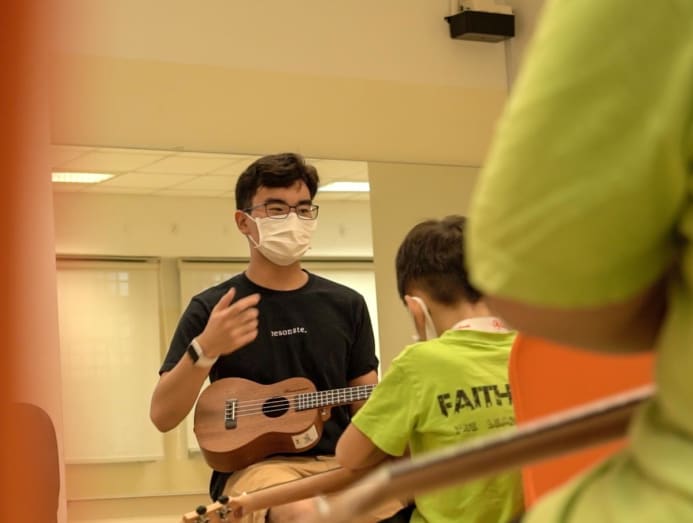Community Heroes: I gave free music lessons to underserved kids. Over time, we became a close-knit family

The writer is co-founder of The Resonance Project.
I spent my late teens building a community and leading others to serve. And I wouldn’t trade the experience for any other.
My former classmate Ivan Chiew — a guitarist and pianist — and I — a drummer, were just 16 when we started The Resonance Project (Reso), which has brought music to communities across Singapore since January 2021.
We hoped to teach music to children who may not have had the same access to music lessons as we did.
To my surprise, we weren't alone. Youths around Singapore resonated with our mission and within six weeks, we already had close to 100 student volunteers signed up with us.
Working with a team this large was completely new to us.
In the following weeks, I began to realise that what we were creating was not just about music. Rather, it represented a wider movement of students who wanted to make a real difference with their time.
Scaling up quickly meant that Reso now had to support three weekly music programmes for our beneficiaries. We had to move fast to build some semblance of a curriculum and develop our first team structure.
We designed a curriculum in four areas: Keyboard, ukulele, guitar and vocals.
Providing free instruments was important to us, so we had to quickly raise funds through T-shirt sales to recoup the hundreds of dollars we had already spent on the first tranche of ukuleles.
Uniquely, our programmes did not have an end date. This meant that the kids we served wouldn’t have to worry about us leaving in a few months.
Each week, our volunteers would run a 90-minute to 120-minute session, inclusive of a practical lesson, games and time for catching up, on one of the four instrument curriculums we taught.
Our pedagogy was simple, less music theory, more enjoying music as an expression, and most importantly, building strong friendships.

Despite the hustle, the next few months were largely smooth sailing. I got to know the kids that I was working with much better, and started to realise the true impact we could bring about with our project.
Many of the children came from less-than-ideal family situations and it was a privilege to be a “kor kor” (older brother) of sorts.
Music might have been our medium, but it was my friendship and presence that really made the difference and brightened up their day.
To my kids, I became affectionately known as “bird's nest hair”. It was always a joy to be greeted by the stampede of primary schoolers excited to see us.
However, growing quickly came with downsides. The level of work and commitment required during the initial setup phase caused several volunteers to leave. We needed to do things differently to keep the team intact.
That meant creating a culture of giving that our volunteers believed in, rather than just a “project” that might be phased out anytime.
Covid-19 restrictions during the pandemic further accelerated this need. Our programmes had barely begun when we had to cancel sessions.
Despite not being able to serve physically, we pivoted towards improving our systems, teams and curriculum instead.
A committed group of about 70 — half our members at the time — poured hundreds of hours working online in task forces. They planned out over a year of curriculum, prepared for hybrid sessions and worked on our administrative systems.
We also launched “Reso Recharge” sessions — weekly online meetups where team members could study, watch movies or have deep conversations.
These sessions provided emotional support to our volunteers during some of the lonelier periods of the semi-lockdown period of the pandemic in 2020.
Over time, our volunteers began to see Reso as a circle of trusted friends and something we found worth investing.
We resumed sessions in late-2021 and welcomed 127 new members that November.
Our team identity also began to form — along with many friendships.
Our previous investment into programme planning also paid dividends. Being better equipped, we could focus more on building relationships with our beneficiaries.
In 2022, our community grew to more than 300 members. We then had our first opportunity to meet in-person after a year of Zoom meetings.
By 2023, many started to describe Reso as a home, a community that they really loved. We also began to reach thousands more across new communities through our events and community concerts.
Now, in 2024, Reso’s weekly sessions serve more than 200 children and seniors at more than 18 locations, including social service agencies and senior activity centres.
To me, these are not merely numbers — they represent real people and relationships.
Three years in, our kids have grown to see us as their kor kors and jie jies (older sisters), while we are like “grandchildren” to our seniors. In short, we get to be like family; ready to listen, support them or even cry with them.
Now, at 20, I’m grateful for the trust of my team, and for all the people from whom I've learned. I am grateful that we built a community, knowing that even after I step down, the work, the culture and the spirit of giving will continue.
As for me, it will soon be time to explore new ways to bring people together.
Through this journey, I’ve learnt that there is value in coming together, investing deeply in people and serving actively. We need many more communities that unite students from different schools in the service of others.
ABOUT THE WRITER:
Elijah Chao, 20, is the co-founder of The Resonance Project. He is currently serving his National Service. Elijah, who was an International Baccalaureate student when he started the ground-up initiative, led his team to build what is now a vibrant collective of youth serving communities across Singapore through the medium of music. He enjoys baking and playing the guitar and the drums in his free time.
The Resonance Project is supported by Bagus Together, an initiative that helps change-makers and ground-ups start and sustain their work.
If you have an experience to share or know someone who wishes to contribute to this series, write to voices [at] mediacorp.com.sg (voices[at]mediacorp[dot]com[dot]sg) with your full name, address and phone number.






